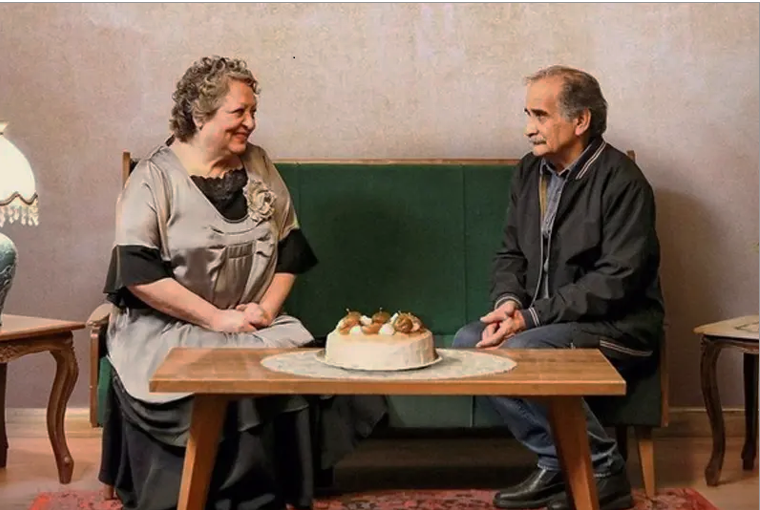“My Favorite Cake” is a film directed by Maryam Moghaddam and Behtash Sanaeeha that tells the story of Mahin, a 70-year-old retired nurse. She lost her husband years ago and her children have emigrated. Tired of loneliness, Mahin seeks to resolve this issue.
✍| By Ms. Fateme charkhtabian
“My Favorite Cake,” a 2024 production, is directed by Maryam Moghaddam and Behtash Sanaeeha. It had its public release in Germany in February 2024. This film is listed as a joint production of France, Germany, Sweden, and Iran; however, it does not have an official release permit from the Iranian Ministry of Culture and Islamic Guidance and was produced in line with Iran’s independent cinema movement. By participating in the Berlin Film Festival, it won the FIPRESCI Prize and the Ecumenical Prize, but despite the filmmakers’ nomination, it couldn’t win the Golden Bear. Additionally, the film has received the following awards:
- Best Film Award from the Cabourg Film Festival in France;
- Best Actress Award from the Kinoart Festival in Slovenia;
- Audience Award for Best Film at the Menton Film Festival in France;
- Best Film at the Cinéfest Sudbury in Canada;
- Best International Film at the Calgary International Film Festival;
- Best Film in the New Directors section at the Chicago International Film Festival.
In this article, we aim to discuss the representation of Iranian women in the film “My Favorite Cake.” So stay with us until the end.
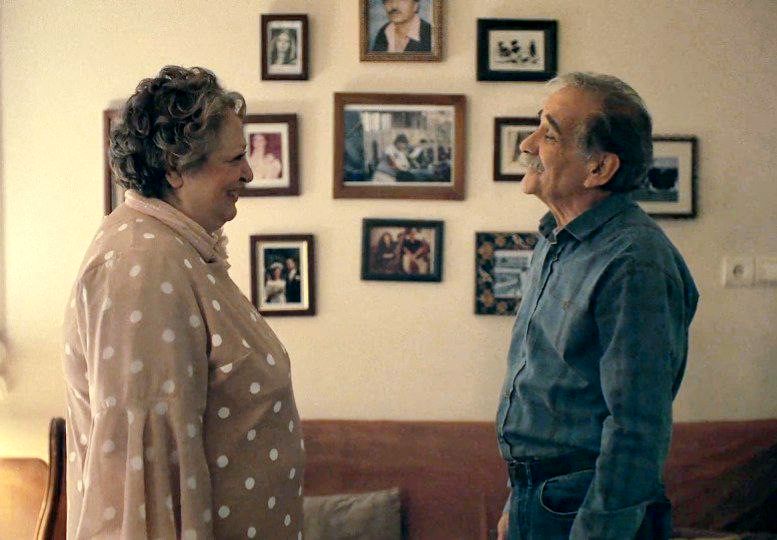
Story Summary
“My Favorite Cake” is the story of a 70-year-old retired nurse named Mahin. She lost her husband years ago and her children have emigrated. Tired of loneliness, Mahin seeks to resolve this issue.
Who is Mahin?
Despite centering on the character of Mahin, “My Favorite Cake” can be considered a feminine film. To understand the portrayal of women in the film, it’s important to examine certain scenes in detail:
Mahin feels the absence of a man in her life. The next morning after a gathering with friends, she leaves her house, deciding to break away from her routine and the things that have led to her loneliness. She goes to the bakery, sits next to a man in the queue, and initiates a conversation with him, even leaning in. However, the man ignores her.
The Pursuit of Connection
Her attempt at finding a partner fails. In her next plan, Mahin goes to the park. She sees a sweeper resting and, despite the man’s disinterest, she starts talking to him and asks him about elderly male athletes. In a video call with her daughter, she introduces the sweeper as her friend. This plan also fails due to the morality police, and she ends up at an army restaurant for lunch.
Despite the empty restaurant, Mahin chooses a table near a group of elderly men. She sits so close that she can hear their conversations. Faramarz, a timid and quiet man, is sitting opposite Mahin but doesn’t notice her presence. When Faramarz mentions being lonely and not having a wife or children, Mahin, like a predator, follows him. She inquires about his workplace and waits for him late into the night. The most powerful scene is when Faramarz arrives and turns on the light in Mahin’s house.
For or Against Women?! That is The Question!
What we understand from these scenes in “My Favorite Cake” is that, contrary to the usual propaganda, Iranian men behave very chastely when dealing with women in society; because in the film, we did not see any sexual or violent behavior from men outside the home against women, and it is the woman in the story who creates disturbances for men in order to achieve her desires, or imposes herself on them in a disgusting and begging manner. Despite this representation, it is surprising why we do not see any protest from the supporters of “independent anti-male women” or even the feminist community?!
The Film’s Hypocrisy: Claiming to Portray Reality
More surprisingly, the filmmakers have claimed in an interview that they wanted to put an end to lies about the reality of Iranian women by making this film! No, they can make any claim they want about the film; except for supporting Iranian women! Iranian national and religious culture confirms the proposition of “chaste man”; but with “vile, clingy woman”, there is an angle as old as history!
At what point in history has the dominant culture in society been such that an Iranian woman would take the hand of a strange man and bring him home at night to relieve her loneliness? Isn’t it true that the buildings, architecture, documents, written and oral memories left from the heart of history have always spoken of the “chastity and nobility of Iranian women”? So from this point of view, we are faced with a film that has no affinity with the reality of Iranian women.
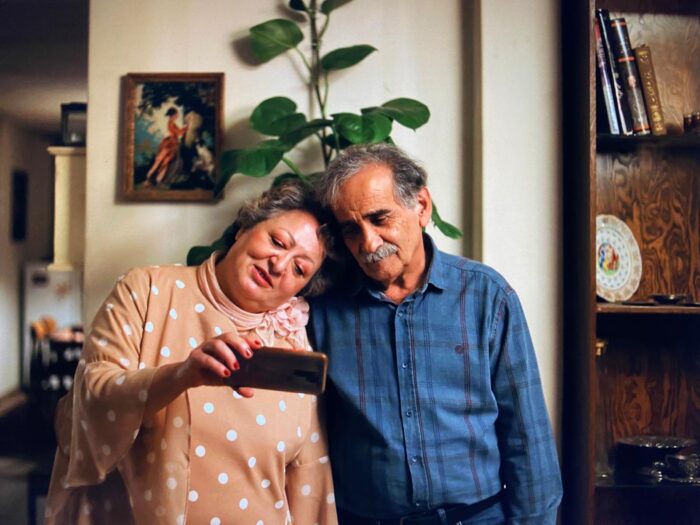
Who is the Iranian Woman in the Film?
From another perspective, we are faced with a categorization of women in the film, which also proves that this film is not the reality of all Iranian women. Mahin is non-religious, anti-revolutionary, and nostalgic for the conditions of the previous regime. She has a neighbor who is religious and supports the regime. The neighbor’s surname is “Hashemi,” she is veiled, frowning, and according to Mahin, nosy. The scene of the conversation between these two takes place while an iron fence separates Mahin and Ms. Hashemi. Mahin is inside the house and Ms. Hashemi is outside the house, standing under a green light, and inquiring about Mahin’s guest.
A Limited and Biased Representation
In another part of “My Favorite Cake”, when Faramarz talks about his ex-wife, he says that she was religious and strict, and he is happy to be separated from her. With these two scenes, it becomes clear that the filmmakers have categorized Iranian women and consider the veiled woman who is attached to religion to be outside their definition of an Iranian woman. This is while Mahin’s behavioral pattern does not have an external counterpart. But according to what rationality or even statistical population, have the filmmakers categorized Iranian women based on their clothing?
Love or a Dialogue of Bodies?
Although the film intends to represent the loneliness of the elderly, it limits loneliness to sexual needs. Because its fundamental view of humans is bodily. There are so many signs and facts of this bodily nature in “My Favorite Cake” that it cannot be seen with a family:
- Mahin rejected her suitor because he didn’t have hair on his hands and chest!
- Her attention is drawn to a news report that says a robot has been created that is suitable for single people because it can bathe them!
- She loves her younger days because she was free to wear a low-cut dress and high heels;
- She constantly pays attention to her clothes and makeup for Faramarz’s sake;
- She asks him about having sex with his girlfriend;
- She doesn’t go to the bathroom with Faramarz, not out of modesty but because her body is not suitable for showing off to a man;
- And finally, she is happy and satisfied with Faramarz’s compliments about her body.
- The audacity reaches its peak when we see a very, very private view of Mahin: where she puts perfume on her body before entering the bedroom…
This level of sexualized view of women in a film is not believable. How can one imagine an elderly woman who, at the peak of her old age, is a moving package of such desires?!
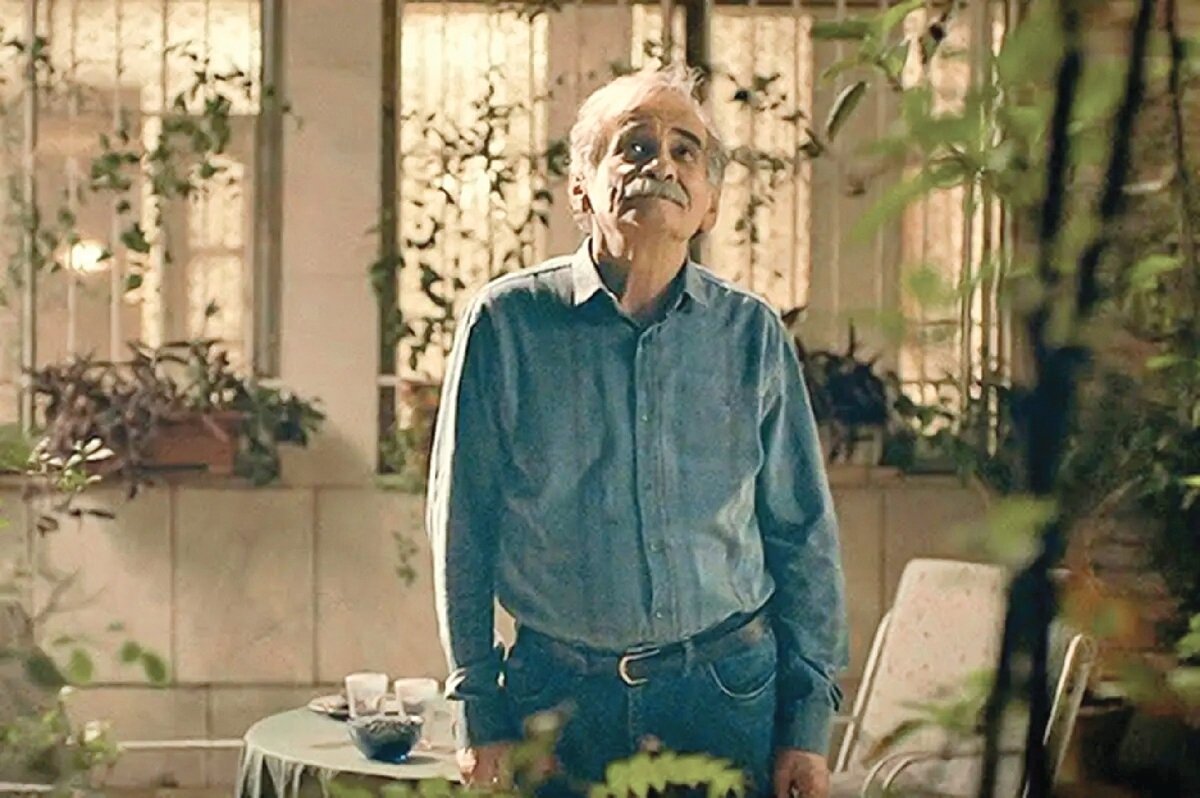
A Focus on the Physical
Naturally, this crude representation of humanity is not only limited to women, and the man in the story is also paired with a body-centeredness and sexual desires. Faramarz, immediately after accepting Mahin’s invitation, purchases the desired pill from the pharmacy. He comments on Mahin’s body twice. He invites her to the bathroom and their conversation revolves around displaying the body to the other.
The Reduction of Love to Physical Intimacy
It should be noted that the warm atmosphere of the film “My Favorite Cake” should not mislead us into thinking that the sexual bond between this man and woman is old love. The nature of love is the distinction of the beloved in the eyes of the lover; but for Mahin, as a seeker and demander of a relationship, there was no such thing as distinction. If someone else were in Faramarz’s place, it would not fundamentally change the story. She was looking for a man (read: male) for a couple of days to satisfy her desires, and it was these men who refused!
Foolish Old People!
If we go beyond the representation of femininity and masculinity in this film, we arrive at the insult to the elderly. One of the special characteristics of old age in our society is wisdom. But what we see in “My Favorite Cake” is an all-out foolishness and stupidity of two 70-year-olds who are mistakenly considered to be simple and innocent old age! An unknown woman invites an unknown man to her home, and the man accepts; while even if there were no religious and social rules, this firm and immediate trust between two strangers, except to satisfy sexual needs, does not seem logical.
The Absence of Wisdom and Maturity
Faramarz, a retired army ground force and a military man. So he should know the value of preserving the border; but he easily expresses regret for being at the front and defending his country and considers it useless. On the other hand, he was a consumer of alcohol in his youth and knows the process of producing alcohol; but not only is he not aware of the amount he consumes, but he also does not know that a 70-year-old man should not consume alcohol and sexual dysfunction pills together!
Even Mahin, who is a nursing expert, is constantly serving him alcohol and is not aware of his bad condition! After Faramarz’s collapse, Mahin cuts off her call to the emergency services and then proceeds to bury him at night in her backyard. It is illogical that Mahin does not think about the consequences of her actions; while the residents of the agency have seen these two together.
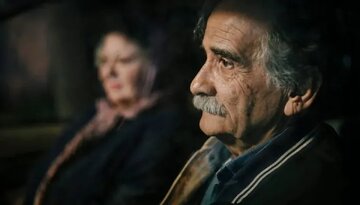
The Undermining of Social Norms
These two old people, especially Mahin, protest against the governing structure in such a way that it seems as if the behaviors they exhibit are acceptable to society, and these heinous behaviors are only the red lines of the government! If this is the case, why is Mahin worried about her neighbors’ judgment? Why does she tell Faramarz to park his car two blocks away? Why, when she was talking to her daughter in the park and her daughter heard the voice of the janitor, did she ask in surprise: “Are your friends men?” The reality is that regardless of the management frameworks, the street-level society is still sensitive and committed to chaste and humane red lines, especially towards the elderly class.
A Good Idea, a Bad Movie!
The movie “My Favorite Cake” presents a good idea but is ultimately a bad film. The loneliness of the elderly is undoubtedly a fascinating cinematic subject for the global community; however, in an attempt to win over international film festivals, the filmmakers have hung a political satire and irony on every corner of the film. This incongruous addition has even soured the mood of the film’s supporters.
A Human Being or a Stage Doll?
If “My Favorite Cake” had been content with its independence, it would have been enough to merely represent the veiling of Iranian women and the difference in their clothing at home and in society, which would have been a good hook to attract an audience. There was no need for this level of deconstruction and focusing on exaggerated sexual issues. Of course, it should be noted that the issue of observing the hijab by actresses in the Islamic Republic is because Iranian cinema views the actress as a human being, not a stage doll; therefore, it respects their human dignity and obliges them to observe etiquette.
From: gesostu.ir


